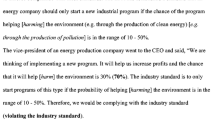Abstract
Social psychologists have evidence that evaluative feedback on others’ choices sometimes has unwelcome negative effects on hearers’ motivation. Holroyd’s article (Holroyd J. Ethical Theory Moral Pract 10:267–278, 2007) draws attention to one such result, the undermining effect, that should help to challenge moral philosophers’ complacency about blame and praise. The cause for concern is actually greater than she indicates, both because there are multiple kinds of negative effect on hearer motivation, and because these are not, as she hopes, reliably counteracted by implicit features of praise and blame. The communicative ideal that she articulates does point us in the right direction, but it requires further elaboration. Once it is spelled out, we find that realizing this ideal, in light of the empirical research, requires rethinking the role of verdict-like judgments within moral feedback.
Similar content being viewed by others
Notes
Holroyd’s term is “moral appraisal”, but I emphasze “feedback” to clarify our focus here on critical messages intended in good faith for the agent, as opposed to evaluative comments intended to express solidarity with a victim, or to give notice to others about someone's character, etc. Our concern, furthermore, is just with unsolicited moral feedback, since the empirical research in question does not involve cases in which subjects have taken the initiative in seeking out critical feedback or advice. Presumably, fewer risks attend feedback that is explicitly or implicitly sought out.
Though Holroyd refers several times to “moral motivation,” her main concerns are minimally related to philosophical debates over whether “moral motivation” is a distinctive kind of motivation springing directly from moral belief. On any view short of extreme Socratic internalism—on which real moral knowledge trumps other factors and suffices to settle a person’s intentions—factors besides moral belief affect the strength of a person’s motivation in actual circumstances. The negative effects on motivation discussed by social psychologists presumably affect overall motivation to comply with a particular norm only by affecting motivational factors other than the supposedly stable internalist kind of reason—“just because it’s right.” Some philosophers might prefer to say, then, that the issue is whether feedback can undermine non-moral aspects of a hearer’s motivation to follow moral norms. While I think it is reasonable to speak of a person’s motivation as more or less attuned to specific moral concerns, I see no neat line separating moral and non-moral kinds of motivation.
See, for example, Birch et al 1984 for an early study focused on backfiring praise; researchers concur, however, that praise undermines motivation in fairly limited circumstances. Claims about the detrimental effects of tangible rewards and incentives (Grant 2006) have inspired controversy—see Eisenberger and Cameron 1996, and a 2001 exchange in the Review of Educational Research (Deci, Ryan and Koestner 2001; Cameron 2001). At any rate, the controversy over the impact of rewards is not central to our inquiry here.
Extrinsic motivation may be too simply modeled by Deci and Ryan, however. The potential intersection of approach and avoidance motivations is discussed by Covington and Müeller 2001.
See, for example, Linda Hamilton Krieger 1995.
It is quite remarkable that Strawson uses this identical phrase (with one variation in word order) three times in “Freedom and Resentment” (48, 62, 66 in Fischer and Ravizza 1999). This phrase serves to obscure the fact that the range of effects one can care about is not reducible the rather manipulative-sounding goal of “regulating behavior in socially desirable ways.”
Kant might endorse this approach but for his confidence that a given problem (what he would call the impossibility of willing a particular world) will lead all people to the same norms. Because our perspectives and insights differ, we should not only allow that others will suggest different norms; we should hope so.
For related reflections on “calling” as a crucial metaphor wherever moral demands come into play, see Rebecca Kukla 2002.
Critics may be wise to conserve their efforts and move on, of course—though even in such cases they will often intentionally or unintentionally inspire others to take up the same concerns in other ways.
Deci and Ryan (1987) explicitly distance themselves from this broad generalization, however.
Noddings (1984) structures all moral concerns around the theme of caring, and makes additional claims about how the moral educator must illustrate a particular commitment to be emulated by the one cared-for. The point in question here need not be tied to those aspects of her view.
There is another distinct reason to avoid expressing summary verdicts on others’ actions: some philosophers simply do not believe moral judgments can be made in a black-and-white fashion. A utilitarian may argue that all action fits within a greyscale continuum between better and worse (Norcross 1997). A virtue-ethicist may go further: just as moves in chess occupy a vast field of qualitative difference that even a good player does not pretend to have mastered, our characteristic moral choices might be obviously better or worse, yes, but often they differ by being bolder or safer, public-minded or privately perfectionistic, etc. Emphasis on the good and the bad may blunt appreciation (both ours and our hearers’) of such differences. I find this line plausible, but it is tangential to the central argument here.
References
Baer R, Hinkle S, Smith K, Fenton M (1980) Reactance as a function of actual versus projected autonomy. J Pers Soc Psychol 38(3):416–422
Birch LL, Marlin DW, Rotter J (1984) Eating as the "means" activity in a contingency: effects on young children’s food preference. Child Dev 55:431–439
Brehm SS, Brehm JW (1981) Psychological reactance: a theory of freedom and control. Academic, New York
Butler R (1987) Task-involving and ego-involving properties of evaluation: effects of different feedback conditions on motivational perceptions, interest, and performance. J Educ Psychol 79:474–482
Card C (1996) The unnatural lottery: character and moral luck. Temple University Press, Philadelphia
Covington MV, Müeller KJ (2001) Intrinsic versus extrinsic motivation: an approach/avoidance reformulation. Educ Psychol Rev 13(2):157–176
Cowan EW, Presbury JH (2000) Meeting client resistance and reactance with reverence. J Couns Dev 78(4):411–419
Darwall SL (1986) Agent-centered restrictions from the inside out. Philos Stud 50:291–319
Deci EL, Ryan RM (1985) Intrinsic motivation and self-determination in human behavior. Plenum, New York
Deci EL, Ryan RM (1987) The support of autonomy and the control of behavior. J Pers Soc Psychol 53:1024–1037
Deci EL, Ryan RM (2000) Self-determination theory and the facilitation of intrinsic motivation, social development, and well-being. Am Psychol 55:68–78
Deci EL, Nezlek J, Sheinman L (1981) Characteristics of the rewarder and intrinsic motivation of the rewardee. J Pers Soc Psychol 40(1):1–10
Elliot AJ, Faler J, McGregor HA, Campbell WK, Sedikides C, Harachiewicz JM (2000) Competence valuation as a strategic intrinsic motivation process. Pers Soc Psychol Bull 26:780–794
Grant RW (2006) Ethics and incentives: a political approach. Am Polit Sci Rev 100:29–39
Holroyd J (2007) A communicative conception of moral appraisal. Ethical Theory Moral Pract 10:267–278
Jones K (1999) Second-hand moral knowledge. J Philos 96:55–78
Kast A, Connor K (1988) Sex and age differences in response to informational and controlling feedback. Pers Soc Psychol Bull 14(3):514–523
Koestner R, Bernieri F, Holt K (1984) Setting limits on children’s behavior: the differential effects of controlling vs. informational styles on intrinsic motivation and creativity. J Pers 52:233–248
Krieger LH (1995) The content of our categories: a cognitive bias approach to discrimination and equal employment opportunity. Stanford Law Rev 47(6):1161–1248
Kukla R (2002) The ontology and temporality of conscience. Cont Philos Rev 35:1–34
MacIntyre A (1981) After virtue. University of Notre Dame Press, Notre Dame
Meyers DT (1997) Emotion and heterodox moral perception: an essay in moral social psychology. In: Meyers DT (ed) Feminists rethink the self. Westview, Boulder CO, pp 197–218
Nail PR, MacDonald G, Very DA (2000) Proposal of a four-dimensional model of social response. Psych Bull 126(3):454–470
Nicholls JG (1984) Achievement motivation: conceptions of ability, subjective experience, task choice, and performance. Psych Rev 91:328–346
Noddings N (1984) Caring: a feminine approach to ethics. University of California Press, Berkeley
Norcross A (1997) Good and bad actions. Philos Rev 106:1–34
Pallak SR, Costomiris S, Sroka S, Pittman TS (1982) School experience, reward characteristics, and intrinsic motivation. Child Development 53:1382–1391
Pittman TS, Emery J, Boggiano AJ (1982) Intrinsic and extrinsic motivational orientations: reward-induced changes in preference for complexity. J Pers Soc Psychol 42(5):789–797
Ryan RM (1982) Control and information in the intrapersonal sphere: an extrension of cognitive evaluation theory. J Pers Soc Psych 43:450–461
Silvia PJ (2006) Reactance and the dynamics of disagreement: multiple paths from threatened freedom to resistance to persuasion. Eur J Soc Psychol 36:673–685
Strawson PF (1974) Freedom and resentment. Freedom and resentment and other essays. Methuen, London, pp 1–25
Wallace RJ (1994) Responsibility and the moral sentiments. Harvard University Press, Cambridge, MA
Vansteenkiste M, Deci EL (2003) Competitively contingent rewards and intrinsic motivation: can losers remain motivated? Motiv Emot 27(4):273–299
Williams B (1981) Moral luck. Cambridge University Press, Cambridge
Woller KM, Buboltz WC, Loveland JM (2007) Psychological reactance: examination across age, ethnicity, and gender. Am J Psychol 120(1):15–24
Wright RA, Wadley VG, Danner M, Phillips PN (1992) Persuasion, reactance, and judgments of interpersonal appeal. Eur J Soc Psychol 22(1):85–91
Acknowledgments
Many thanks to Jules Holroyd for collegial and illuminating dialogue; to comments by my colleagues at Wesleyan University, and by Philip Bennett, Scott Plous, David Slutsky, and Rajal Cohen. Thanks also to the careful critical attention of anonymous reviewers at this journal.
Author information
Authors and Affiliations
Corresponding author
Rights and permissions
About this article
Cite this article
Springer, E. Moral Feedback and Motivation: Revisiting the Undermining Effect. Ethic Theory Moral Prac 11, 407–423 (2008). https://doi.org/10.1007/s10677-008-9116-8
Received:
Accepted:
Published:
Issue Date:
DOI: https://doi.org/10.1007/s10677-008-9116-8




